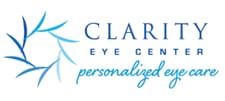
Comprehensive eye care is an essential part of ensuring your overall well-being. At Clarity Eye Center, our eye doctors have the education and experience necessary to detect, prevent, and treat a wide range of eye conditions.
What is Comprehensive Eye Care?
A comprehensive eye exam is a crucial part of maintaining your vision and eye health. Unlike a simple vision screening, these thorough exams assess every aspect of your eye health.
During your visit to Clarity Eye Center, your eye doctor will examine your eye health as well as review your overall health history, as many systemic conditions can affect your eye health. Most people should have these exams regularly to catch potential issues early and ensure their eyes stay healthy for years to come.
What Happens During an Eye Exam?
An eye exam at Clarity Eye Center is a comprehensive process designed to assess both vision and overall eye health. The exam will begin with a review of your medical history and any current vision concerns.
Your eye doctor will then conduct a series of tests, starting with a vision test using an eye chart to measure how well you can see at various distances. After this, they will perform a refraction test to determine if corrective lenses are needed or if your current prescription needs updating.
Your eye doctor will then examine your eyes’ external and internal structures using a special microscope, check eye muscle balance, and likely dilate your pupils for a thorough evaluation of the retina and optic nerve. Your eye pressure will also be measured to test for glaucoma.
Your eye doctor may do additional testing depending on your age, health, and initial findings. At the end of the exam, your eye doctor will discuss the results and provide any necessary recommendations for maintaining or improving eye health.
How Often Do I Need to Have an Eye Exam?
How often you might need to have an eye exam depends on various factors, including your age, risk factors, and overall eye health. For children, it’s often recommended that they have their first comprehensive eye exam at six months, then at three years, and before starting school.
After that, yearly exams are beneficial to monitor their developing vision. Adults between eighteen and sixty with no risk factors and who don’t wear corrective lenses can typically have an exam every two years.
However, if you wear glasses or contacts, yearly exams are recommended to ensure your prescription remains accurate. For adults over sixty, it’s important to have annual exams.
As you age, the risk for eye diseases increases, making regular check-ups crucial for maintaining eye health. If you have risk factors such as diabetes, high blood pressure, or a family history of eye disease, you may need more frequent exams.
Your eye doctor at Clarity Eye Center in Round Rock, Texas, will recommend a personalized schedule based on your individual needs.
What Are Common Signs of Vision Problems?
While regular eye exams are crucial for detecting issues early, it’s important to be aware of potential signs of vision problems between visits. If you experience blurred or fuzzy vision, difficulty seeing objects at a distance or up close, or find yourself squinting or straining to see clearly, it’s time to schedule a check-up.
Frequent headaches, especially after reading or computer use, can also be a sign of vision issues. Other symptoms to watch out for include double vision, seeing halos around lights, eye pain or discomfort, and sudden changes in vision.
If you’re having difficulty seeing at night or in low light, frequently losing your place while reading, or noticing floaters or flashes of light in your vision, these could also indicate potential problems. Remember, these symptoms don’t necessarily mean you have a serious eye condition, but they do warrant a check-up to ensure your eyes are healthy.
Is it time for you to have an eye exam? Schedule an appointment at Clarity Eye Center in Round Rock, TX, today!


